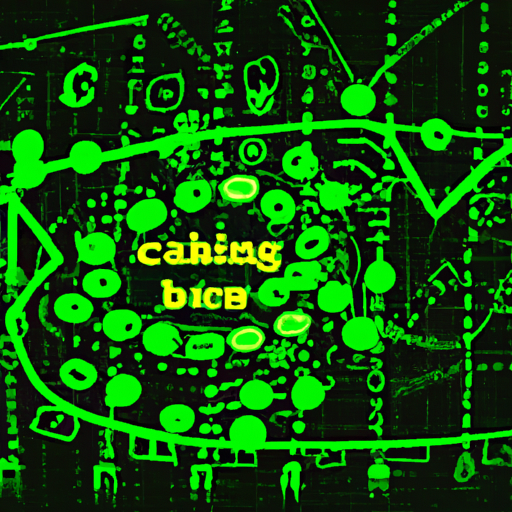
-
TopCasino Slots On-line Slots, Blackjack, Roulette, Betting & Gambling Opinions & Guides: TOC
- Introduction
- The Impact of Big Data on Bookmaking Strategies
- How Big Data is Revolutionizing the Sports Betting Industry
- Predictive Analytics and Bookmaking: A Match Made in Heaven
- The Role of Machine Learning in Bookmaking
- Big Data and the Future of In-Play Betting
- Using Big Data to Identify Betting Trends and Patterns
- The Ethics of Using Big Data in Bookmaking
- How Bookmakers are Leveraging Big Data to Improve Customer Experience
- The Importance of Real-Time Data in Bookmaking Operations
- How Big Data is Helping Bookmakers Manage Risk and Reduce Losses
- The Role of Artificial Intelligence in the Future of Bookmaking
- The Benefits and Challenges of Implementing a Big Data Strategy for Bookmakers
- How Big Data is Changing the Way We Bet on Horse Racing
- The Impact of Social Media on Big Data Analysis for Bookmakers
- Exploring the Relationship Between Big Data and Responsible Gambling Practices
- Q&A
- Conclusion
"Big Data: Revolutionizing the Future of Bookmaking"
Introduction
Big knowledge has develop into an integral half of the bookmaking trade. With the assist of superior analytics and machine learning algorithms, bookmakers can now analyze huge quantities of knowledge to make knowledgeable choices about odds and betting strains. This has led to more correct predictions and better outcomes for each bookmakers and bettors alike. In this article, we will discover the position of big knowledge in the growth of bookmaking and how it is altering the panorama of sports betting.
The Impact of Big Data on Bookmaking Strategies
In latest years, the world of bookmaking has undergone a vital transformation. The rise of big knowledge has played a essential position in this transformation, offering bookmakers with useful insights and data that they will use to develop more efficient methods.
One of the most vital impacts of big knowledge on bookmaking is its capability to provide bookmakers with real-time details about occasions and tendencies. This data might be used to make more knowledgeable choices about which bets to supply and how a lot to cost for them. For instance, if a specific team is performing well in a specific sport, bookmakers can regulate their odds accordingly to mirror this Development.
One other way that big knowledge is altering the world of bookmaking is by enabling bookmakers to better perceive their customers. By analyzing buyer knowledge, bookmakers can gain insights into what varieties of bets are most popular, which sports are most popular among their customers, and even what time of day customers are most more likely to place bets. Armed with this data, bookmakers can tailor their choices to better meet the wants and preferences of their customers.
Big knowledge can be serving to bookmakers to determine potential dangers and opportunities. By analyzing historic knowledge on betting patterns and outcomes, bookmakers can determine tendencies that will point out potential dangers or opportunities. For instance, if a specific type of bet has traditionally been associated with high losses for bookmakers, they could select to restrict or get rid of that type of bet from their choices.
In addition to those advantages, big knowledge can be serving to bookmakers to enhance their general effectivity and profitability. By automating many elements of the betting process utilizing machine learning algorithms and different superior applied sciences, bookmakers can scale back costs whereas enhancing accuracy and pace. This permits them to supply more aggressive odds whereas nonetheless sustaining healthy revenue margins.
In fact, there are additionally some challenges associated with the use of big knowledge in bookmaking. One main challenge is making certain the accuracy and reliability of the knowledge being used. With a lot knowledge obtainable, it might be difficult to separate the sign from the noise and determine which knowledge factors are actually related and helpful.
One other challenge is making certain that bookmakers are utilizing big knowledge in an moral and accountable method. There is a risk that bookmakers may use buyer knowledge to take advantage of weak people or have interaction in different unethical practices. To handle these considerations, many jurisdictions have applied laws and tips governing the use of buyer knowledge by bookmakers.
Regardless of these challenges, it is evident that big knowledge will continue to play a vital position in the growth of bookmaking methods. As know-how continues to advance and more knowledge turns into obtainable, bookmakers will have even more instruments at their disposal for analyzing tendencies, figuring out dangers and opportunities, and tailoring their choices to fulfill the wants of their customers. Finally, this will result in a more environment friendly, efficient, and worthwhile bookmaking trade that advantages each bookmakers and bettors alike.
How Big Data is Revolutionizing the Sports activities Betting Industry
The sports betting trade has been around for hundreds of years, but it is only in latest years that it has seen a vital transformation. The advent of know-how and the rise of big knowledge have revolutionized the way bookmakers function, making it easier for them to foretell outcomes and provide more correct odds.
Big knowledge refers to the huge quantities of data generated by numerous sources, including social media, online platforms, and mobile devices. This knowledge might be analyzed utilizing refined algorithms to determine patterns and tendencies that may assist bookmakers make knowledgeable choices.
One of the ways big knowledge is remodeling the sports betting trade is thru the use of predictive analytics. By analyzing historic knowledge on teams, gamblers, and occasions, bookmakers can predict future outcomes with higher accuracy. This permits them to regulate their odds accordingly and provide more aggressive prices to customers.
One other way big knowledge is altering the game is thru real-time monitoring. Bookmakers can now track live occasions as they occur and regulate their odds in real-time based on altering circumstances. For instance, if a key player will get injured throughout a game, bookmakers can rapidly regulate their odds to mirror this new data.
Big knowledge additionally allows bookmakers to personalize their choices to particular person customers. By analyzing buyer conduct and preferences, bookmakers can tailor their promotions and offers to specific segments of their buyer base. This not only improves buyer satisfaction but additionally helps bookmakers enhance revenue by concentrating on high-value customers.
Nonetheless, there are additionally considerations about the use of big knowledge in sports betting. Some critics argue that it may result in an unfair benefit for bookmakers who've access to more knowledge than others. There are additionally considerations about privateness and security points related to the assortment and storage of private data.
Regardless of these considerations, it is evident that big knowledge will continue to play a vital position in the growth of bookmaking. As know-how continues to advance and more knowledge turns into obtainable, bookmakers will be capable to make even more correct predictions and provide more customized services to their customers.
In conclusion, the sports betting trade is present process a vital transformation because of the rise of big knowledge. Bookmakers are actually in a position to make more knowledgeable choices, provide more aggressive prices, and provide customized services to their customers. Whereas there are considerations about the use of big knowledge in sports betting, it is evident that it will continue to play a essential position in the growth of bookmaking in the years to come back.
Predictive Analytics and Bookmaking: A Match Made in Heaven
In latest years, the world of bookmaking has undergone a vital transformation. The rise of big knowledge and predictive analytics has revolutionized the way bookmakers function, permitting them to make more knowledgeable choices and enhance their general profitability.
At its core, bookmaking is all about predicting the consequence of sporting occasions and different contests. Historically, bookmakers relied on their own experience and instinct to set odds and decide which bets to simply accept. Nonetheless, this method was typically flawed, as it was based on subjective opinions quite than hard knowledge.
Enter big knowledge. With the advent of highly effective computing instruments and refined algorithms, bookmakers can now analyze huge quantities of data to gain insights into every thing from player efficiency to climate patterns. By utilizing this knowledge to tell their choice-making processes, they will make more correct predictions and scale back their risk publicity.
One key space the place big knowledge has had a main affect is in the growth of predictive fashions. These fashions use historic knowledge to determine patterns and tendencies that may be used to foretell future outcomes. For instance, a bookmaker may use previous efficiency knowledge for a specific team or athlete to foretell how they will carry out in an upcoming match or occasion.
One other important application of big knowledge in bookmaking is in risk administration. By analyzing massive quantities of knowledge on betting patterns and market tendencies, bookmakers can determine potential dangers and take steps to mitigate them. For instance, if a massive quantity of bets are being positioned on one specific consequence, the bookmaker might regulate their odds or restrict the amount that may be wagered on that consequence.
In fact, there are additionally challenges associated with utilizing big knowledge in bookmaking. One main problem is making certain that the knowledge being used is correct and dependable. Inaccurate or incomplete knowledge can result in flawed predictions and poor choice-making.
One other challenge is balancing the want for accuracy with the want for pace. In order to remain aggressive in a fast-paced trade like sports betting, bookmakers want to have the ability to make choices rapidly. Nonetheless, this can generally result in shortcuts being taken in the knowledge evaluation process, which can compromise the accuracy of the predictions.
Regardless of these challenges, it is evident that big knowledge has had a vital affect on the world of bookmaking. By offering bookmakers with highly effective instruments for analyzing and decoding knowledge, it has helped them to make more knowledgeable choices and enhance their general profitability. As know-how continues to evolve, it is probably going that we will see even more progressive makes use of of big knowledge in this trade in the years to come back.
The Role of Machine Studying in Bookmaking
In latest years, the world of bookmaking has undergone a vital transformation. With the advent of big knowledge and machine learning, bookmakers have been in a position to make more knowledgeable choices and provide better odds to their customers.
Machine learning algorithms are used to research huge quantities of knowledge, including historic betting patterns, player statistics, and climate conditions. This data is then used to foretell the consequence of sporting occasions and different competitions.
One of the key advantages of utilizing machine learning in bookmaking is that it permits bookmakers to regulate their odds in real-time based on new data. For instance, if a star player is injured simply before a game, the odds for that team could also be adjusted accordingly.
One other benefit of utilizing machine learning in bookmaking is that it may also help to determine patterns and tendencies which may not be instantly obvious to human analysts. By analyzing massive datasets, machine learning algorithms can uncover hidden correlations between totally different variables that would affect the consequence of a game or occasion.
In fact, there are additionally some potential drawbacks to utilizing machine learning in bookmaking. One concern is that it may result in a scenario the place all bookmakers are offering equivalent odds for each occasion. This may make it difficult for bettors to search out value in the market and may finally result in a decline in curiosity in sports betting.
To keep away from this situation, many bookmakers are actually utilizing machine learning algorithms as only one half of their general choice-making process. They nonetheless depend on human analysts and different sources of data to make ultimate choices about odds and betting strains.
Regardless of these considerations, there is no such thing as a doubt that machine learning has played an important position in the growth of trendy bookmaking. By offering access to huge quantities of knowledge and highly effective analytical instruments, it has helped bookmakers provide more correct odds and better serve their customers.
Trying forward, it appears possible that machine learning will continue to play an more and more important position in the world of sports betting. As know-how continues to advance and more knowledge turns into obtainable, bookmakers will be capable to make even more knowledgeable choices and provide even better odds to their customers.
In fact, there are additionally some potential dangers associated with this development. As more and more people turn to sports betting as a supply of entertainment or revenue, it is important for regulators to make sure that the trade stays fair and clear.
General, nonetheless, it appears clear that machine learning has had a optimistic affect on the world of bookmaking. By offering access to huge quantities of knowledge and highly effective analytical instruments, it has helped bookmakers provide better odds and serve their customers more successfully. As know-how continues to advance, we are able to anticipate this development to continue in the years forward.
Big Data and the Future of In-Play Betting
The world of sports betting has undergone a vital transformation in latest years, because of the advent of big knowledge. The use of superior analytics and machine learning algorithms has enabled bookmakers to gain useful insights into the conduct of their customers, as well as the efficiency of particular person athletes and teams. This, in turn, has led to the growth of more refined betting markets, including in-play betting.
In-play betting is a form of sports wagering that enables bettors to place bets on occasions which can be already underway. This type of betting has develop into more and more popular in latest years, as it offers a more dynamic and interactive expertise for sports fans. Nonetheless, it additionally presents unique challenges for bookmakers, who should be capable to rapidly process huge quantities of knowledge in order to supply correct odds and reduce their risk.
One way that bookmakers are utilizing big knowledge to enhance their in-play betting choices is by analyzing real-time knowledge feeds from sporting occasions. By monitoring elements akin to player efficiency, climate conditions, and crowd noise, bookmakers can regulate their odds in real-time to mirror altering circumstances. This not only improves the accuracy of their odds but additionally permits them to supply more various and partaking betting markets.
One other way that big knowledge is remodeling the world of sports betting is thru the use of predictive analytics. By analyzing historic knowledge on athlete and team efficiency, bookmakers can determine patterns and tendencies that could be indicative of future outcomes. This permits them to supply more knowledgeable predictions on upcoming matches and occasions, which may also help entice new customers and enhance general revenue.
Nonetheless, there are additionally considerations about the potential dangers associated with the use of big knowledge in sports betting. For instance, some critics argue that the elevated reliance on algorithms and automation may result in a loss of human judgment and choice-making abilities. Others fear about the potential for knowledge breaches or different security points that would compromise delicate buyer data.
Regardless of these considerations, it appears clear that big knowledge will continue to play a vital position in the growth of bookmaking and sports betting more broadly. As know-how continues to advance, bookmakers will have access to even more highly effective instruments for analyzing and decoding knowledge, which may result in even more progressive and partaking betting markets.
Finally, the success of big knowledge in sports betting will depend upon how well bookmakers are in a position to balance the advantages of superior analytics with the want for human judgment and experience. By leveraging the power of big knowledge whereas additionally sustaining a sturdy deal with buyer service and risk administration, bookmakers can create a actually dynamic and partaking sports betting expertise that appeals to fans around the world.
Using Big Data to Determine Betting Trends and Patterns
In latest years, the world of bookmaking has undergone a vital transformation. With the advent of big knowledge, bookmakers have been in a position to gain insights into betting tendencies and patterns that have been beforehand unimaginable to discern. This has allowed them to make more knowledgeable choices about which bets to supply and how to price them.
One of the key ways in which big knowledge is being used in bookmaking is thru the evaluation of historic betting knowledge. By analyzing previous betting patterns, bookmakers can determine tendencies and patterns that could be indicative of future outcomes. For instance, if a specific horse persistently attracts a high quantity of bets in the lead-as much as a race, this might counsel that it is more likely to carry out well.
One other way in which big knowledge is being used in bookmaking is thru the evaluation of social media knowledge. By monitoring social media platforms akin to Twitter and Facebook, bookmakers can gain insights into what people are speaking about and what they're in. This may also help them to determine potential betting opportunities that they could not have in any other case thought-about.
In addition to those strategies, some bookmakers are additionally utilizing machine learning algorithms to research massive volumes of knowledge in real-time. These algorithms are in a position to determine patterns and tendencies that might not be instantly obvious to human analysts. This permits bookmakers to make more correct predictions about future occasions and regulate their odds accordingly.
In fact, there are additionally some challenges associated with utilizing big knowledge in bookmaking. One of the biggest challenges is making certain that the knowledge being analyzed is correct and dependable. Inaccurate or incomplete knowledge can result in incorrect predictions and finally consequence in losses for each bookmakers and bettors.
One other challenge is making certain that the use of big knowledge does not compromise the integrity of sporting occasions. There have been considerations raised about the potential for bookmakers to make use of their access to massive quantities of knowledge to affect outcomes or have interaction in match-fixing actions.
Regardless of these challenges, it appears clear that big knowledge will continue to play an more and more important position in the growth of bookmaking. As know-how continues to advance and more knowledge turns into obtainable, bookmakers will be capable to gain even deeper insights into betting tendencies and patterns. This will allow them to supply more aggressive odds and provide a better general expertise for their customers.
In conclusion, the use of big knowledge in bookmaking is a quickly evolving subject that has already had a vital affect on the trade. By utilizing historic betting knowledge, social media evaluation, and machine learning algorithms, bookmakers are in a position to gain insights into betting tendencies and patterns that have been beforehand unimaginable to discern. Whereas there are actually challenges associated with the use of big knowledge in bookmaking, it appears clear that this development is here to remain. As know-how continues to advance, we are able to anticipate to see even more refined makes use of of big knowledge in the world of bookmaking.
The Ethics of Using Big Data in Bookmaking
In latest years, the use of big knowledge has develop into more and more prevalent in the world of bookmaking. Bookmakers are utilizing knowledge to tell their choices and enhance their odds, but this raises moral questions about the use of private data and the potential for exploitation.
One of the principal considerations with utilizing big knowledge in bookmaking is the assortment and use of private data. Bookmakers collect a huge amount of knowledge on their customers, including their betting historical past, preferences, and even their social media exercise. This data might be used to create detailed profiles of particular person bettors, which can then be used to focus on them with customized offers and promotions.
Whereas some might argue that this is simply good business practice, others see it as an invasion of privateness. Prospects might not be conscious that their private data is being collected and used in this way, and they could not have given their consent for it to be used in this method.
One other concern is the potential for exploitation. Bookmakers can use big knowledge to determine patterns in betting conduct and regulate their odds accordingly. Which means that they will doubtlessly manipulate the market to make sure a revenue, regardless of the consequence of a specific occasion.
This raises questions about equity and transparency in bookmaking. If bookmakers are utilizing big knowledge to gain an unfair benefit over their customers, then this may undermine belief in the trade as a entire.
Nonetheless, there are additionally arguments in favor of utilizing big knowledge in bookmaking. For instance, it may also help bookmakers to determine downside playing conduct and intervene before it turns into a critical problem. By analyzing betting patterns and different knowledge factors, bookmakers can determine when a buyer could also be at risk of creating a playing addiction and provide support or advice.
Big knowledge may assist bookmakers to enhance their odds and provide more aggressive prices to customers. By analyzing huge quantities of historic knowledge on sporting occasions or different markets, bookmakers can make more knowledgeable choices about how to set their odds. This will result in more correct predictions and better value for customers.
Finally, the use of big knowledge in bookmaking is a advanced problem with no easy answers. Whereas there are actually moral considerations around the assortment and use of private data, there are additionally potential advantages to each bookmakers and customers.
As the trade continues to evolve, it will be important for bookmakers to be clear about their use of knowledge and be sure that they're appearing in the greatest pursuits of their customers. By doing so, they may also help to construct belief and confidence in the trade as a entire.
How Bookmakers are Leveraging Big Data to Improve Customer Experience
In latest years, the world of bookmaking has undergone a vital transformation. With the advent of big knowledge, bookmakers have been in a position to leverage this know-how to enhance their buyer expertise and keep forward of the competitors.
One way in which bookmakers are utilizing big knowledge is by analyzing buyer conduct. By monitoring how customers work together with their platforms, bookmakers can gain useful insights into what works and what doesn't. For instance, they will see which varieties of bets are most popular, which sports generate the most curiosity, and which markets are most worthwhile.
This data can then be used to tailor the buyer expertise. Bookmakers can create customized suggestions for every particular person buyer based on their previous conduct. They may use this knowledge to optimize their platform's layout and design, making it more person-pleasant and intuitive.
One other way in which bookmakers are utilizing big knowledge is by analyzing exterior elements that will affect betting outcomes. For instance, they will track climate patterns, injury studies, and different information occasions that will have an effect on the consequence of a game or match. This data can then be used to regulate odds and strains accordingly.
Bookmakers are additionally utilizing big knowledge to combat fraud and guarantee fair play. By monitoring betting patterns throughout their platforms, they will determine suspicious exercise and take action before it turns into a downside. They may use machine learning algorithms to detect anomalies in betting conduct that will point out fraudulent exercise.
General, the position of big knowledge in bookmaking is becoming more and more important. As competitors heats up in this trade, bookmakers should discover new ways to distinguish themselves from their rivals. By leveraging big knowledge, they will gain useful insights into buyer conduct and market tendencies that will assist them keep forward of the curve.
Nonetheless, there are additionally considerations about the use of big knowledge in bookmaking. Some critics argue that it may result in an unfair benefit for certain gamblers or teams if bookmakers have access to more data than others. Others fear that the use of big knowledge may result in a loss of privateness for customers.
Regardless of these considerations, it appears clear that big knowledge will continue to play a main position in the growth of bookmaking. As know-how continues to evolve, bookmakers will want to remain on top of the latest tendencies and improvements in order to stay aggressive. By embracing big knowledge, they will gain useful insights into buyer conduct and market tendencies that will assist them keep forward of the curve.
The Significance of Actual-Time Data in Bookmaking Operations
In the world of sports betting, bookmakers are always looking for ways to gain an edge over their rivals. One of the most important instruments in their arsenal is big knowledge. By analyzing huge quantities of data in real-time, bookmakers can make more knowledgeable choices and enhance their general profitability.
Actual-time knowledge is especially important in bookmaking operations as a result of it permits bookmakers to react rapidly to modifications in the market. For instance, if a key player on a football team is injured simply before a game, the odds for that team might shift dramatically. Bookmakers who're in a position to regulate their odds rapidly will be better positioned to draw bets from customers who need to take benefit of the new data.
In addition to reacting rapidly to modifications in the market, real-time knowledge additionally permits bookmakers to determine tendencies and patterns which may not be instantly obvious. For instance, by analyzing knowledge on previous video games between two teams, a bookmaker may discover that one team tends to carry out better when playing at residence. Armed with this information, they will regulate their odds accordingly and doubtlessly enhance their income.
In fact, accumulating and analyzing all of this knowledge requires refined know-how and expert analysts. Many bookmakers now make use of teams of knowledge scientists who specialize in extracting insights from massive datasets. These analysts use a variety of instruments and strategies, including machine learning algorithms and predictive modeling, to determine patterns and make predictions about future outcomes.
One space the place big knowledge has been notably helpful for bookmakers is in live betting. Live betting permits customers to place bets throughout a game or occasion as it unfolds. This type of betting has develop into more and more popular in latest years, but it presents unique challenges for bookmakers.
As a result of live betting occurs in real-time, bookmakers want to have the ability to process huge quantities of data rapidly and precisely. They additionally want to have the ability to regulate their odds quickly as occasions unfold on the subject or courtroom. Big knowledge plays a essential position in enabling bookmakers to do this successfully.
For instance, throughout a football game, bookmakers may collect knowledge on the quantity of accomplished passes, the time of possession for every team, and the quantity of yards gained on every play. They can then use this data to regulate their odds in real-time based on which team is performing better. By doing so, they will entice more bets from customers who're watching the game and looking for opportunities to make cash.
In fact, there are additionally dangers associated with relying too closely on big knowledge in bookmaking operations. One concern is that bookmakers might develop into too reliant on algorithms and fashions, and lose sight of the human ingredient of sports betting. One other risk is that bookmakers might develop into overconfident in their capability to foretell outcomes based on historic knowledge, and fail to account for sudden occasions or upsets.
Regardless of these dangers, it's clear that big knowledge will continue to play an important position in the growth of bookmaking. As know-how continues to advance and more knowledge turns into obtainable, bookmakers will have even more instruments at their disposal for analyzing tendencies and making predictions. The challenge will be to strike a balance between counting on knowledge-pushed insights and sustaining a human touch in the world of sports betting.
How Big Data is Serving to Bookmakers Handle Danger and Cut back Losses
In latest years, the world of bookmaking has undergone a vital transformation. With the rise of know-how and the availability of huge quantities of knowledge, bookmakers have been in a position to leverage big knowledge to handle risk and scale back losses.
One of the key ways in which big knowledge helps bookmakers is thru the use of predictive analytics. By analyzing massive quantities of historic knowledge, bookmakers can determine patterns and tendencies that may assist them make more correct predictions about future occasions. This permits them to set odds which can be more reflective of the true probability of an consequence, lowering their publicity to risk.
One other way in which big knowledge helps bookmakers is thru the use of machine learning algorithms. These algorithms are designed to study from previous knowledge and make predictions based on that learning. By utilizing machine learning algorithms, bookmakers can rapidly analyze huge quantities of knowledge and determine patterns that will be difficult or unimaginable for people to detect. This permits them to make more knowledgeable choices about how to set odds and handle risk.
In addition to predictive analytics and machine learning, big knowledge can be being used by bookmakers to watch betting exercise in real-time. By analyzing incoming bets as they occur, bookmakers can rapidly determine any uncommon patterns or anomalies that will point out fraudulent exercise or insider buying and selling. This permits them to take action rapidly and forestall losses before they happen.
In fact, there are additionally dangers associated with utilizing big knowledge in bookmaking. One potential concern is that bookmakers might develop into too reliant on algorithms and lose sight of the human ingredient concerned in setting odds. Moreover, there may be always a risk that hackers or different malicious actors may gain access to delicate betting data and use it for nefarious functions.
Regardless of these dangers, nonetheless, it appears clear that big knowledge will continue to play an more and more important position in the world of bookmaking. As know-how continues to advance and more knowledge turns into obtainable, it is probably going that we will see even more refined makes use of of big knowledge in the bookmaking trade.
General, it is evident that big knowledge has had a vital affect on the world of bookmaking. By leveraging predictive analytics, machine learning algorithms, and real-time monitoring, bookmakers are in a position to handle risk and scale back losses more successfully than ever before. Whereas there are actually dangers associated with utilizing big knowledge in this way, it appears possible that we will continue to see more and more refined makes use of of this know-how in the years to come back.
The Role of Artificial Intelligence in the Future of Bookmaking
The world of bookmaking has undergone a vital transformation in latest years, because of the advent of big knowledge and synthetic intelligence. These applied sciences have revolutionized the way bookmakers function, enabling them to make more knowledgeable choices and provide better services to their customers.
One of the key ways in which big knowledge is being used in bookmaking is thru the evaluation of buyer conduct. By accumulating and analyzing huge quantities of knowledge on buyer preferences, betting patterns, and different elements, bookmakers can gain useful insights into what their customers need and how they behave. This data can then be used to tailor their services to better meet these wants, ensuing in a more customized and satisfying expertise for customers.
One other important application of big knowledge in bookmaking is in risk administration. By analyzing historic knowledge on sporting occasions, climate patterns, and different elements that may affect the consequence of a bet, bookmakers can determine potential dangers and take steps to mitigate them. This may also help them keep away from expensive losses and be sure that they can provide aggressive odds whereas nonetheless sustaining profitability.
Artificial intelligence can be playing an more and more important position in the future of bookmaking. One space the place AI is especially helpful is in the growth of predictive fashions. By utilizing machine learning algorithms to research massive datasets, bookmakers can develop highly correct fashions that may predict the consequence of sporting occasions with a high diploma of accuracy. This permits them to supply more aggressive odds and entice more customers.
AI can be being used to automate many elements of bookmaking, from buyer service to risk administration. Chatbots powered by AI are becoming more and more widespread on betting web sites, offering customers with instant support and help every time they want it. In the meantime, machine learning algorithms are being used to watch betting patterns and determine potential fraud or different dangers.
In fact, there are additionally some considerations about the use of big knowledge and AI in bookmaking. Some critics fear that these applied sciences may very well be used to take advantage of weak people or to govern the consequence of sporting occasions. Nonetheless, most bookmakers are dedicated to utilizing these applied sciences in a accountable and moral method, and there are strict laws in place to make sure that they achieve this.
General, it is evident that big knowledge and AI are playing an more and more important position in the growth of bookmaking. These applied sciences are enabling bookmakers to supply more customized services, better handle risk, and provide more correct predictions. As these applied sciences continue to evolve, we are able to anticipate to see even more exciting developments in the world of bookmaking in the years forward.
The Benefits and Challenges of Implementing a Big Data Technique for Bookmakers
In latest years, the use of big knowledge has develop into more and more popular in numerous industries, including bookmaking. Big knowledge refers to the massive and advanced sets of knowledge that may be analyzed to disclose patterns, tendencies, and insights. Bookmakers have acknowledged the potential advantages of implementing a big knowledge strategy, but in addition they face a number of challenges.
One of the principal advantages of utilizing big knowledge in bookmaking is the capability to make more knowledgeable choices. By analyzing massive quantities of knowledge, bookmakers can determine patterns and tendencies that might not be instantly obvious. This may also help them make more correct predictions about the outcomes of sporting occasions or different varieties of bets.
One other profit is the capability to personalize offers for customers. By analyzing buyer knowledge, bookmakers can tailor their offers to particular person preferences and behaviors. This will result in elevated buyer satisfaction and loyalty.
Nonetheless, implementing a big knowledge strategy additionally comes with its own set of challenges. One challenge is the sheer quantity of knowledge that must be processed and analyzed. Bookmakers want to take a position in know-how and infrastructure that may deal with this amount of knowledge.
One other challenge is making certain the accuracy and reliability of the knowledge being analyzed. Bookmakers want to make sure that their knowledge sources are reliable and that any errors or inconsistencies are recognized and corrected.
Privateness considerations are additionally a challenge when it involves utilizing buyer knowledge for customized offers. Bookmakers want to make sure that they're complying with related privateness legal guidelines and laws, akin to GDPR in Europe.
Regardless of these challenges, many bookmakers have already started implementing big knowledge methods. For instance, some bookmakers use machine learning algorithms to research betting patterns and determine potential fraud or cash laundering actions.
Others use predictive analytics to forecast future betting tendencies based on historic knowledge. This permits them to regulate their odds accordingly and keep forward of rivals.
In conclusion, big knowledge has develop into an important software for bookmakers looking to gain a aggressive edge in a crowded market. Whereas there are challenges to implementing a big knowledge strategy, the potential advantages are vital. By making more knowledgeable choices and personalizing offers for customers, bookmakers can enhance buyer satisfaction and loyalty whereas additionally enhancing their bottom line. As know-how continues to evolve, it is probably going that big knowledge will develop into an excellent more important half of the bookmaking trade.
How Big Data is Changing the Means We Guess on Horse Racing
In latest years, the world of bookmaking has undergone a vital transformation. The rise of big knowledge has played a essential position in this change, permitting bookmakers to make more knowledgeable choices and provide better odds to their customers. One space the place big knowledge is having a notably vital affect is in horse racing.
Horse racing has always been a popular sport for betting, with millions of people around the world inserting bets on races yearly. Nonetheless, until recently, bookmakers had limited data to work with when setting odds. They would depend on fundamental statistics akin to a horse's previous efficiency and the jockey's record, but this data only scratched the floor of what was obtainable.
At this time, because of advances in know-how and the availability of huge quantities of knowledge, bookmakers have access to an unprecedented degree of details about horses and races. This contains every thing from detailed records of every horse's previous performances to real-time knowledge on track conditions and climate patterns.
By analyzing this knowledge utilizing refined algorithms and machine learning strategies, bookmakers can gain insights into which horses are most more likely to win a race and regulate their odds accordingly. This not only advantages the bookmaker by lowering their risk but additionally advantages the buyer by offering more correct odds that mirror the true probability of every consequence.
One instance of how big knowledge is being used in horse racing is thru the use of predictive modeling. Predictive modeling entails utilizing historic knowledge to determine patterns and tendencies that may be used to foretell future outcomes. In horse racing, this may contain analyzing elements akin to a horse's age, weight, and earlier race times to find out its probability of winning a specific race.
One other way that big knowledge is altering the way we bet on horse racing is thru the use of real-time analytics. Actual-time analytics entails accumulating and analyzing knowledge as it occurs, permitting bookmakers to make speedy changes to their odds based on altering conditions akin to climate or track conditions.
For instance, if a sudden rainstorm hits the track, bookmakers can rapidly regulate their odds to mirror the incontrovertible fact that certain horses could also be better suited to operating in moist conditions. This not only advantages the bookmaker by lowering their risk but additionally advantages the buyer by offering more correct odds that mirror the current state of the race.
In fact, there are some challenges associated with utilizing big knowledge in horse racing. One of the biggest challenges is making certain that the knowledge being used is correct and dependable. With a lot knowledge obtainable, it might be difficult to separate helpful data from noise or irrelevant knowledge.
One other challenge is making certain that bookmakers are utilizing big knowledge ethically and responsibly. There is a risk that bookmakers may use big knowledge to govern odds in their favor or exploit weak customers who might not absolutely perceive how odds are calculated.
Regardless of these challenges, it's clear that big knowledge is having a vital affect on the world of bookmaking and horse racing. By offering bookmakers with more correct and detailed details about races and horses, big knowledge helps to create a more degree playing subject for each bookmakers and customers alike. As know-how continues to advance and more knowledge turns into obtainable, it's possible that we will see even more progressive makes use of of big knowledge in this exciting and dynamic trade.
The Impact of Social Media on Big Data Analysis for Bookmakers
In latest years, the world of bookmaking has undergone a vital transformation. The rise of big knowledge and social media has revolutionized the way bookmakers function, offering them with unprecedented access to data that may be used to make more knowledgeable choices.
One of the key ways in which social media has impacted big knowledge evaluation for bookmakers is thru the sheer quantity of knowledge that's now obtainable. With millions of people utilizing social media platforms each day, there is a gigantic amount of knowledge being generated on a fixed foundation. This knowledge might be analyzed to determine tendencies and patterns that may assist bookmakers make more correct predictions about future occasions.
One other important side of social media's affect on big knowledge evaluation for bookmakers is the capability to track sentiment. By monitoring social media conversations, bookmakers can gain useful insights into how people are feeling about certain occasions or outcomes. This data can then be used to regulate odds or make different strategic choices.
In fact, analyzing all this knowledge requires refined instruments and strategies. Bookmakers should make investments in highly effective analytics software and rent expert analysts who can interpret the knowledge successfully. This funding can pay off in a big way, nonetheless, as it permits bookmakers to remain forward of the competitors and make more worthwhile choices.
One space the place big knowledge evaluation has been notably helpful for bookmakers is in predicting the outcomes of sporting occasions. By analyzing historic knowledge on teams and gamblers, as well as current tendencies and different elements, bookmakers can develop highly correct fashions for predicting the consequence of video games. These fashions can then be used to set odds that mirror the true probability of every consequence.
In addition to sports betting, big knowledge evaluation can be being used in different areas of bookmaking akin to political betting and entertainment betting. In these areas, social media plays an excellent greater position as it provides a wealth of details about public opinion and sentiment.
Regardless of its many advantages, there are additionally some challenges associated with utilizing big knowledge evaluation in bookmaking. One of the biggest challenges is making certain that the knowledge being analyzed is correct and dependable. With a lot knowledge being generated each day, it might be difficult to separate the sign from the noise and determine which knowledge factors are actually related.
One other challenge is making certain that bookmakers are utilizing the knowledge ethically and responsibly. There have been considerations raised about the potential for big knowledge evaluation to be used to govern outcomes or exploit weak people. It's important for bookmakers to function with transparency and integrity, and to make sure that they don't seem to be utilizing their access to knowledge in ways that would hurt others.
General, nonetheless, it is evident that big knowledge evaluation has had a vital affect on the growth of bookmaking. By offering bookmakers with access to huge quantities of data, social media has reworked the way they function and enabled them to make more knowledgeable choices. As know-how continues to evolve, it will be interesting to see how bookmakers continue to adapt and innovate in response.
Exploring the Relationship Between Big Data and Accountable Gambling Practices
The world of bookmaking has undergone a vital transformation in latest years, with the advent of big knowledge playing a essential position in shaping the trade. The use of knowledge analytics has enabled bookmakers to make more knowledgeable choices, resulting in better outcomes for each the bookmaker and the buyer.
Nonetheless, as with any technological development, there are considerations about the potential destructive affect that big knowledge may have on accountable playing practices. In this article, we will discover the relationship between big knowledge and accountable playing practices and look at how bookmakers can use knowledge analytics to advertise accountable playing.
One of the key advantages of big knowledge is its capability to provide insights into buyer conduct. By analyzing huge quantities of knowledge, bookmakers can determine patterns and tendencies that will be unimaginable to detect by means of conventional strategies. This data can then be used to tailor marketing campaigns and promotions to particular person customers, growing their engagement with the platform.
Nonetheless, this degree of personalization additionally raises considerations about the potential for bookmakers to take advantage of weak customers. For instance, if a bookmaker identifies a buyer who is especially prone to playing addiction, they could be tempted to focus on them with offers designed to encourage additional betting.
To handle these considerations, many bookmakers have applied accountable playing measures which can be powered by big knowledge. These measures include instruments akin to self-exclusion programs and deposit limits which can be designed to assist customers handle their playing habits.
In addition to those measures, some bookmakers are utilizing big knowledge to determine customers who could also be at risk of creating a playing downside. By analyzing buyer conduct over time, bookmakers can determine warning indicators akin to elevated frequency or amount of bets positioned. This data can then be used to intervene early and provide support before a downside develops.
One other way that big knowledge is being used in the growth of accountable playing practices is thru predictive analytics. By analyzing historic knowledge on buyer conduct, bookmakers can predict which customers are most more likely to develop a playing downside. This data can then be used to focus on these customers with tailor-made interventions, akin to customized messages or support programs.
Nonetheless, it is important to note that whereas big knowledge might be a highly effective software in selling accountable playing practices, it shouldn't be a silver bullet. Finally, the accountability for accountable playing lies with each the bookmaker and the buyer. Bookmakers should be sure that they're utilizing knowledge analytics in an moral and accountable method, whereas customers should take accountability for their own playing habits.
In conclusion, big knowledge has played a vital position in the growth of bookmaking in latest years. Whereas there are considerations about its potential destructive affect on accountable playing practices, many bookmakers are utilizing knowledge analytics to advertise accountable playing by means of measures akin to self-exclusion programs and predictive analytics. By working collectively, bookmakers and customers can be sure that big knowledge is used in a way that advantages everybody concerned.
Q&A
1. What is big knowledge?
Big knowledge refers to massive and advanced sets of knowledge that can not be processed utilizing conventional knowledge processing strategies.
2. How is big knowledge used in bookmaking?
Big knowledge is used in bookmaking to research numerous elements akin to player efficiency, team statistics, climate conditions, and different variables that may have an effect on the consequence of a game.
3. What are the advantages of utilizing big knowledge in bookmaking?
The advantages of utilizing big knowledge in bookmaking include more correct predictions, better risk administration, and improved profitability.
4. How does big knowledge assist bookmakers make more correct predictions?
Big knowledge helps bookmakers make more correct predictions by offering them with a wealth of details about previous performances, tendencies, and different related elements that may affect the consequence of a game.
5. What position does machine learning play in the growth of bookmaking?
Machine learning plays a essential position in the growth of bookmaking by enabling bookmakers to research huge quantities of knowledge rapidly and precisely.
6. How do bookmakers use predictive analytics to enhance their operations?
Bookmakers use predictive analytics to enhance their operations by analyzing historic knowledge to determine patterns and tendencies that may assist them make better choices about which bets to supply and how a lot to cost for them.
7. What are some challenges associated with utilizing big knowledge in bookmaking?
Some challenges associated with utilizing big knowledge in bookmaking include making certain the accuracy and reliability of the knowledge, managing massive volumes of data, and defending delicate buyer data.
8. How do bookmakers guarantee the accuracy and reliability of their knowledge?
Bookmakers guarantee the accuracy and reliability of their knowledge by utilizing superior algorithms and statistical fashions to research it and determine any errors or inconsistencies.
9. What affect has big knowledge had on the sports betting trade?
Big knowledge has had a vital affect on the sports betting trade by enabling bookmakers to make more knowledgeable choices about which bets to supply and how a lot to cost for them.
10. How has the use of big knowledge modified the way bookmakers function?
The use of big knowledge has modified the way bookmakers function by enabling them to research huge quantities of data rapidly and precisely, which has led to more correct predictions and improved profitability.
11. What are some moral issues associated with utilizing big knowledge in bookmaking?
Some moral issues associated with utilizing big knowledge in bookmaking include making certain the privateness and security of buyer data, avoiding bias and discrimination, and selling accountable playing practices.
12. How can bookmakers be sure that they're utilizing big knowledge ethically?
Bookmakers can be sure that they're utilizing big knowledge ethically by implementing strict privateness insurance policies, avoiding discriminatory practices, and selling accountable playing practices.
13. What affect has the COVID-19 pandemic had on the use of big knowledge in bookmaking?
The COVID-19 pandemic has had a vital affect on the use of big knowledge in bookmaking by disrupting sports schedules and limiting access to live occasions, which has made it more difficult to collect correct and dependable knowledge.
14. How do bookmakers adapt to modifications in the availability of knowledge brought on by occasions like the COVID-19 pandemic?
Bookmakers adapt to modifications in the availability of knowledge brought on by occasions like the COVID-19 pandemic by counting on different sources of data akin to historic knowledge, player statistics, and different related elements that may assist them make knowledgeable choices about which bets to supply.
15. What does the future maintain for the position of big knowledge in bookmaking?
The future holds continued development and growth for the position of big knowledge in bookmaking as new applied sciences emerge that allow even more refined evaluation and prediction capabilities.
Conclusion
In conclusion, big knowledge has played a vital position in the growth of bookmaking. It has enabled bookmakers to make more knowledgeable choices and enhance their general operations. With the continued development of know-how and knowledge analytics, it is probably going that big knowledge will continue to shape the future of bookmaking.
















